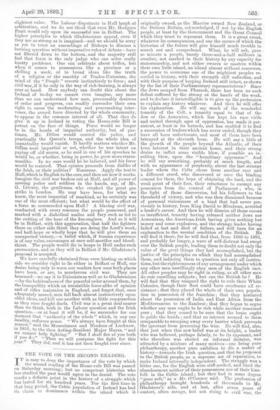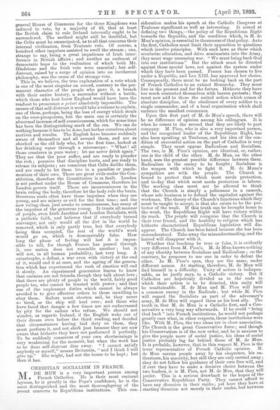THE VOTE ON THE SECOND READING.
IT is easy to deny the importance of the vote by which the second reading of the Home-rule Bill was passed on Saturday morning ; but no competent historian who has studied the past would agree in the denial. The vote marks a definite point in the history of a struggle which has lasted for six hundred years. For the first time in that long period, the Celtic population of Ireland has had its claim to dominance within the island which it originally owned, as the Maories owned New Zealand, or the Britons Britain, acknowledged, if not by the English people, at least by the Government and the Great Council which they trust to represent them. It is a great event, whatever its consequences, and one the causes of which the historian of the future will give himself much trouble to search out and comprehend. What, he will ask, gave so minute a, people, barely three-and-a-half millions in number, not marked in their history by any capacity for statesmanship, and not either owners or masters within their own little island, an island almost without resources, the power to overcome one of the mightiest peoples re- corded in history, with their strength still unbroken, and , with their purpose of keeping Ireland still intact, as shown by the list of their Parliamentary representatives P Since the Jews escaped from Pharaoh, there has been no such defeat suffered by the strong at the hands of the weak, and to declare it unintelligible is to give up the pretension to explain any history whatever. And then he will offer his explanation. He will say much of the wonderful tenacity of the Celt, a tenacity equal to that of the Jew or the Armenian, which has kept his race virile and united through ages of oppression, has made it per- sistent, at least in its hatreds, and has enabled it to find a succession of leaders which has never ended, though they have all been unfortunate, and most of them have been betrayed at the eleventh hour. He will say a little of the growth of the people beyond the Atlantic, of their keen interest in their ancient home, and their strong desire to inflict some visible blow, if possible an in- sulting blow, upon the " hereditary oppressor." And he will say something, probably at much length, and with an appearance of perplexity, about the last strange leader whom the Celts chose from another race and a different creed, who discovered at once the binding cement for them, the hope of obtaining the'land, and the weak point of their foes, their reluctance to exempt any possession from the control of Parliament ; who, in the light of those discoveries, led his followers to the threshold of victory, and who was then dismissed because of personal viciousness of a kind that had never pre- viously in history, from King David to Mirabeau, arrested a leader's career. And then he will dismiss all those causes as insufficient, tenacity having released neither Jews nor Armenians, the American-Irish having given nothing but money and some explosives, and the strange leader having failed at last and died of failure, and will turn for an explanation to the mental condition of the British. He will find it there, for he will find that, from 1880 to 1803, and probably far longer, a wave of self-distrust had swept over the British people, leading them to doubt not only the value of the great things they had accomplished, but the justice of the principles on which they had accomplished them, and inducing them to question not only all institu- tions, but the righteousness of any arrangement under which any other men unwillingly obey men of the English race. All other peoples may be right in ruling, as all other men do rule unwilling subjects ; but can the British be ? He will find that they resigned the right to rule their White Colonies, though their fleet could have overborne all re- sistance ; that they placed the whole of their own popula- tion in possession of the franchise ; that they hesitated about the possession of India and East Africa, from the Mediterranean to the Zambesi ; that they began to argue whether any man ought to be rich while another remained poor ; that they ceased to be sure that the brain ought to guide the hands ; and that no interest seemed to them comparable to sweeping away every barrier which prevents the ignorant from governing the wise. He will find, also, that just when this new belief was at its height, a leader who was believed, perhaps falsely, to be its exponent, and who therefore was elected an informal dictator, was attracted by a mixture of many motives—one being pure philanthropy, another pure ambition to die a maker of history—towards the Irish question, and that he proposed to the British people, as a supreme act of reparation, to make Ireland internally independent. The struggle was a. bitter one, for the English were stiff-necked, and liked the abandonment neither of their possessions nor of their kins- folk in the Celtic island ; but they had in some degree "gone soft," as a Mr. O'Connor said. The profession of philanthropy brought hundreds of thousands to Mr. Gladstone's side, and at last, after seven years of contest, often savage, but not rising to civil war, the general House of Commons for the three Kingdoms was induced to vote, by a majority of 43, that at least the British claim to rule Ireland internally ought to be surrendered. The method might still be doubtful, but the Celts must be emancipated, as to all that concerns their internal civilisation, from Teutonic rule. Of course, a hundred other impulses assisted to swell the stream ; one, strange to say, being a great impatience of Irish inter- ference in British affairs ; and another an outburst of democratic hope to the realisation of which both Mr. Gladstone and the Irish vote were essential ; but self- distrust, raised by a surge of opinion into an incoherent philosophy, was the cause of the strange vote. This is, we believe, the true explanation of a vote which is one of the most singular on record, contrary to the per- manent character of the people who gave it, a breach with their entire history, a surrender without a battle, which those who best know England would have been the readiest to pronounce a priori absolutely impossible. The causes of that self-distrust it would take avolume to explain, one of them, perhaps, being the loss of energy which steals on the over-prosperous, but the main one is certainly the abnormal increase of self-consciousness, which for some time has been the distinguishing mark of the era. We can do nothing because it has to be done,but bother ourselves about motives and results. The English have become suddenly aware of themselves and all around them, and are as shocked as the old lady who, for the first time, looked at her drinking water through a microscope : " What ! all those creatures in pure water ; let me never drink again." They see that the poor suffer, and are ready to plunder the rich ; perceive that discipline hurts, and are ready to release its subjects ; are conscious that Celts dislike them, and are ready to let them live in a paradise or pande- monium of their own. There are great evils under the Con- stitution, therefore the Constitution is in fault. London is not perfect under the House of Commons, therefore let London govern itself. There are inconveniences in the brain ruling the body, therefore let the body rule the brain. Generous souls often have those impulses when they are young, and see misery or evil for the first time ; and the new ruling class, just awake to consciousness, has many of the impulses of the generous young. It trusts all manner of people, even Irish Jacobins and London Socialists, with a pathetic faith, and believes that if everybody turned scavenger, not only would all the dirt in the world be removed, which is only partly true, but that everybody 'being thus occupied, the rest of the world's work would go on, which is demonstrably false. How long the phase of feeling will last it is impos- :eible to tell, for though France has passed through it, one nation does not resemble another ; but it will not, in all human probability, last very long. A catastrophe, a defeat, a war even with victory at the end of it, would end it at once, and the ageing of the genera- tion which has experienced the rush of emotion will end it slowly. An experienced generation learns to know that enemies are not friends, though they talk about love ; that there are plenty of people in the world, fairly good people too, who cannot be trusted with power ; and that one of the unpleasant duties which cannot be always avoided is to give effective orders to those unwilling to obey them. Sailors must shorten sail, be they never so tired, or the ship will heel over ; and those who have faced that danger a, few times are not embarrassed by pity for the sailors who refuse. We should not wonder, as regards Ireland, if the English woke out of their dream even before the third reading, and decided that circumstances having laid duty on them, they must perform it, and not shirk just because they are now aware that hitherto they have not performed it perfectly. To be suddenly conscious of your own. shortcomings is very weakening for the moment, but when the work has -to be done self-distrust dies away. " I cannot satisfy Anybody or myself," moans Britannia, " and I think I will give up." She might, had not the house to be kept ; but then it has.



















































 Previous page
Previous page